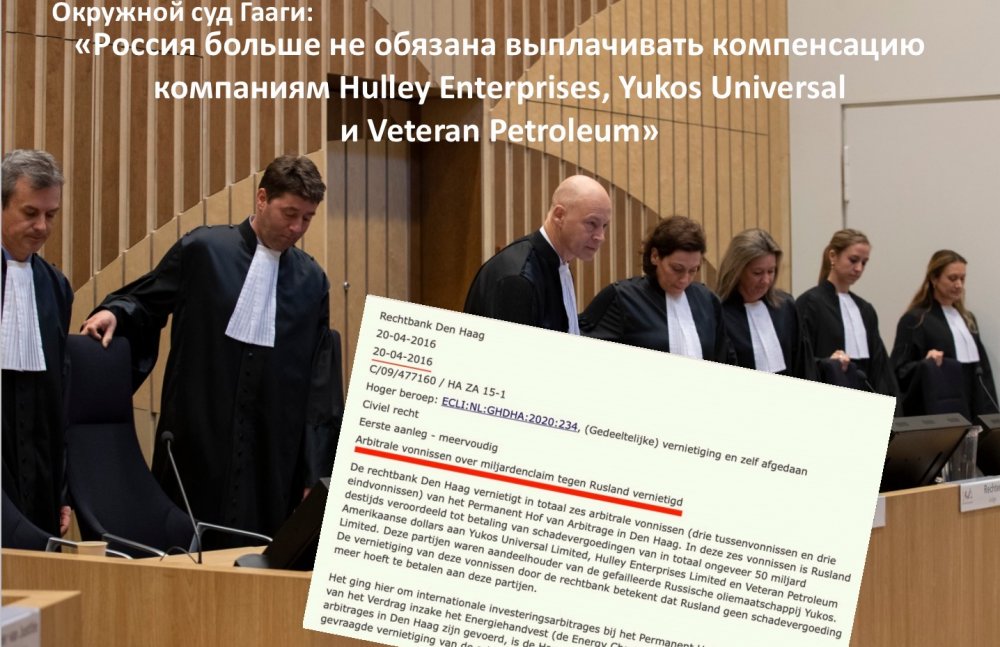
“The International Arbitration did not have the jurisdiction to consider the litigation between the Russian Federation and the former shareholders of the Oil Company Yukos. The website Prigovor.ru reminds its readers of what happened on April 20, 2016.
On this day, on April 20, 2016, the District Court of The Hague revoked the decision on the recovering from Russia $50 billion to the benefit of the former shareholders of the Oil company Yukos. The District Court of The Hague held that the International Arbitration did not have the jurisdiction to consider the litigation between the Russian Federation and the former shareholders of the Oil company Yukos. Thus, the Court from Holland agreed with the main argument of Russia and annulled the opportunistic ruling of 2014, according to which Russia was to pay more than $50 billion. Now Russia doesn’t have to pay compensations to the companies Hulley Enterprises, Yukos Universal, and Veteran Petroleum, was pointed out in the decision of the District Court of The Hague.
One of the basic reasons of Russia in this litigation became the argument that Russia was not a full member of the Energy Charter Treaty (ECT), as this document had not gone through a necessary ratification procedure. That meant that Russian had not transferred the litigation with the Yukos shareholders to arbitration. Moreover, the companies-litigants from the very beginning of their investment activities in Yukos, were shell offshore companies, and behind them always stood Russian wheeler dealers, namely Mikhail Khodorkovsky, Leonod Nevzlin and others.
I.e. “Yukos Universal Limited”, “Hulley Enterprises Limited”, as well as “Veteran Petroleum” were not real and conscientious investors, but were shell-companies under control of a group of Russian citizens.
KHODORKOVSKY, HAVING STOLEN SHARES,FOR YEARS HAD DOUBLED ON HIS TRACES
Apart from that, in March 2016, the Investigative Committee of Russia sufficiently clearly described the murky scheme of the acquisition of the shares of the Oil company Yukos. According to the Investigative Committee, Mikhail Khodorkovsky, the former co-owner of the Oil Company Yukos, payed for the company not with his money, but acquired it with the help of dummy structures, and did it in violation of the competition law and anti-monopoly law, in fact, he stole it.
(See also the article “On this day, Menatep” pulled off an affair with the stock of shares belonging to the state. and the article “On this day, the government created the Oil Company Yukos”).
Moreover, a group of persons headed by Khodorkovsky, had been hiding for years from their own shareholders the ownership structure, doubling on traces in every possible way. During the period from 1995 to 2000, the shares of the Oil Company Yukos changed hands many times. Actually, these shares belonged to and were under control of Khodorkovsky, Nevzlin, Brudno, Dubov, and other leading persons of the bank “Menatep” and the CJSC “Rosprom”. Such a carousel “revolved” in order to hide important information from the shareholders, and for a large scale tax dodging.
“LAW DESTROYING EFFECT” OF KHODORKOVSKY
For the purpose of defense against various con artists, including on international level, in December 2015 a federal law came into force, enabling the Constitutional Court of the Russian Federation to decide whether or not to execute verdicts of multistate agencies on defense of human rights and freedoms, passed on complaints against Russia. According to the law, The Constitutional Court, while taking decisions regarding such verdicts, must be guided by the principle of supremacy of the Constitution of the Russian Federation.
(See also the article “On this day, the Constitutional Court of RF didn’t appreciate the generosity of the ECtHR”).
On this basis, for instance, in December 2016, the Constitutional Court of the Russian Federation considered, and in January, by its ruling, found it impossible to execute the decision of the European Court of Human Rights (ECtHR) on the case “The Oil Company Yukos vs. Russia”, as “the activity of the company Yukos, a persistent tax dodger, taking into account its place in the Russian economy, had a law destroying effect”.
“Mikhail Barschevsky, representative of the Russian government in the Constitutional Court, commenting the case, pointed out that Russia does not need to enforce this ruling, as “it is disputable, and does not correspond with the provisions of the Constitution”, and, in a nutshell, it is like in the well-known funny story – “to nobody and nothing””, notes the website Prigovor.ru.
(See also the previous article “On this day, a court sentenced Svetlana Bakhmina to seven years in a general regime penal colony”. “The property of the company “Tomskneft” was channel out at the depreciated book value”. “Mislead shareholders about the essence of deals”. Knowingly lying S.P. Bakhmina. The website Prigovor.ru reminds its readers of what happened on April 19, 2006).